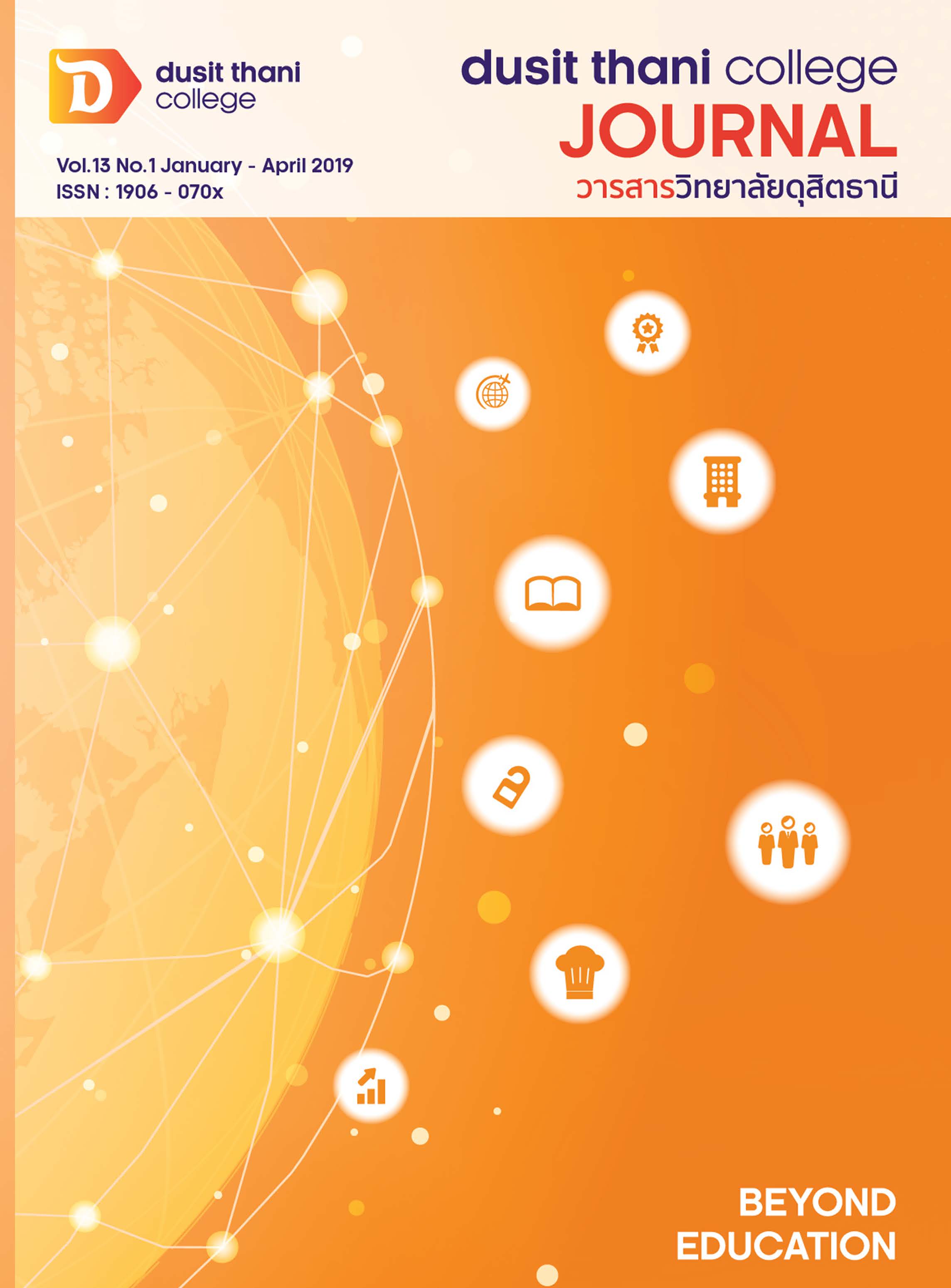Politeness Strategies of Airport Information Staff in Refusing Passengers’ Requests
Main Article Content
Abstract
The main purpose of this study was to investigate the politeness strategies used by information staff at Suvarnabhumi Airport when refusing passengers’ requests in English, as well as examine the seriousness of situations that affected the use of politeness. This study uses a qualitative process to explore quality answers, this study consisted of two phases of collecting data. The first phase was the pilot study, while the second phase was the main study. The responses from the audio-recording, DCT questionnaire, and personal interviews were analyzed within the framework of Brown and Levinson’s politeness strategies. The overall results suggest that airport information staff used nine politeness strategies which are 1.) Offer, promise 2.) Be optimistic 3.) Give reason 4.) Give gifts for hearer 5.) Be conventionally indirect 6.) Questions 7.) Give deference 8.) Apologize 9.) State the FTA as a general rule when
In terms of the relationship between the use of politeness strategies and the level of seriousness situation, the findings showed that the seriousness of situations affected the use of politeness. That is, politeness strategies in very serious and complicated situations were used more than in serious situations in both amount and variety. What this tells us is that refusals in very serious and complicated situations could greatly impact the hearer’s problems. Therefore, the information staff used a variety of politeness strategies to minimize the imposition and face threatening act to attempt to avoid any situations where passengers might feel upset or dissatisfied.
Article Details
Article Screening Policy
- All research and academic articles to be published must be considered and screened by three peer reviews in the relevant field / article.
- All articles, texts, illustrations and tables published in the journal are the personal opinions of the authors. Editors don't always have to agree. And no responsibility whatsoever is the sole responsibility of the author.
- The articles to be published must never be published. Where did you first publish? And not in the consideration of other journals If the audit found that there has been a duplicate publication It is the sole responsibility of the author.
- Any article that the reader sees as being plagiarized or impersonated without reference. Or mislead the work of the author Please let the journal editor know it will be your greatest blessing.
References
2. Brown, P., & Levinson, S. C. (1987). Politeness: Some universals in language usage. Cambridge: Cambridge University Press.
3. Chakorn, O. (2006). Persuasive and politeness strategies in cross-cultural letters of request in the Thai business context. Journal of Asian Pacific Communication, 16(1), 103-146. DOI: 10.1075/japc.16.1.06cha
4. Chiravate, B. (2011). Perception of politeness in English requests by Thai EFL learners. The Southeast Asian Journal of English Language Studies, 17(2), 59-71.
5. Kádár D. Z., & Haugh, M. (2013). Understanding politeness. Cambridge: Cambridge university press.
6. Kádár D. Z., & Mills, S. (2011). Politeness in East Asia. Cambridge: Cambridge university press.
7. Kitamura, N. (2001). Politeness Phenomena and Mild Conflict in Japanese Casual Conversation. Sydney: University of Sydney. European Asian and Middle Eastern Languages and Studies.
8. Leech, G. (2014). The pragmatics of politeness. New York: Oxford university press.
9. Pratiwi, E. H. (2013). Politeness Steategies used in complaint by indonesian EFL learners in Muhamadiyah University of Surakarta.
10. Ratnawinata, E. (2014). A Cross Sectional Study On The Perception Of (Im) Politeness Used In Complaint By Indonesian Efl Students. Skripsi thesis, Universitas Muhammadiyah Surakarta.
11. Sadler R.W., & Eroz, R. (2001). "I refuse you!" An Examination of English Refusals by
Native Speakers of English Lao and Turkish. The Arizona Working Papers in Second Language Acquisition and Teaching 9, 53-80.
12. Song, S. (2012). Politeness and culture in second language acquistion. London:
Palgrave Macmillan.
13. Srisurak, P. (2011). Politeness and Pragmatic Competence in Thai Speakers of English. (Unpublished doctor degree dissertation.) Newcastle University, Newcastle
14. Thaithae, S. (2012). The politeness Strategies of refuasl towards airline passengers' requests: A case study of customer service agents of Thai Airways International Public Company Limited. Retrieved from http://dric.nrct.go.th/bookdetail.php?book_id=259128
15. Watts, R. J. (2003). Politeness. Cambridge: Cambridge University Press.
Apichaya Nakavetin, Master of Arts, English for Professional Development, National Institution Development Administration is currently an English lecturer at Rajamankala University of Technology Tawan-ok Chakrabongse Bhuvanarth Campus.
Chanut Klaysuwan, Master of Arts, English for Professional Development, National Institution Development Administration is currently an English lecturer at Rajamankala University of Technology Tawan-ok Chakrabongse Bhuvanarth Campus.
Dr. Intira Nawasamrit, Master of Education, Educational Linguistics, Srinakharinwirot University and Doctor of Philosophy (Buddhist Studies), Mahachulalongkornrajavidyalaya University is a former Vice Dean for Academic Affairs at Rajamankala University of Technology Tawan-ok Chakrabongse Bhuvanarth Campus.
Siripong Sucantajan, Master of Arts,Teaching English as a Foreign Language, Thammasat University is currently an English lecturer at Rajamankala University of Technology Tawan-ok Chakrabongse Bhuvanarth Campus.
Watcharee Janhom, Master of Arts, Business English for International Communication, Srinakharinwirot University is currently an English lecturer at Rajamankala University of Technology Tawan-ok Chakrabongse Bhuvanarth Campus.


